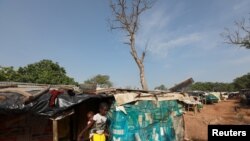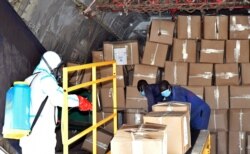The World Health Organization is calling for an end to conflict in Africa so governments and health officials can focus on combating the spread of coronavirus.
The continent has recorded more than 600,000 cases of the virus, with 14,000 deaths.
"For at least three months, vulnerable communities have been experiencing social-economic difficulties exacerbated by COVID-19," WHO's Africa head, Matshindiso Moeti, said Thursday in a media briefing held over Zoom. "It is in the interest of peace, international security, and equity that all countries and partners do more for the civilians affected by the violent conflict. I'll call for all parties to the conflict to implement the U.N. Security Council resolution on COVID-19, focusing on our common enemy, the virus, and ceasing hostilities."
Several African countries such as Burkina Faso, Nigeria and Mali are coping with Islamist insurgencies, while others like South Sudan are dealing with inter-communal fighting.
According the UNHCR, more than 1.5 million people have been displaced in the Sahel region this year, raising the total number of displaced across sub-Saharan Africa to 27 million.
The Central Africa Republic has hosted more than 600,000 refugees. The country's health minister, Pierre Somse, said Thursday the government is overwhelmed by the health and humanitarian situation, but is still reaching out to the most vulnerable to help them during the pandemic.
"Half of the people are in a humanitarian situation, one-third in displaced camps," he said. "What we have done is to focus [on] looking for those who are at high risk and making sure they are detected early enough and brought to the hospital in order to avoid them having complications."
Adhieu Achuil Dhieu, a South Sudanese refugee living in the Dadaab camp in northeastern Kenya, said the coronavirus has made life more difficult.
"The businesses have declined because of inflation. For example, we used to buy 1 kilogram of beans for 100 shillings. Today, it's 200 shillings," Dhieu said. "The other thing, social, physical contact, is not being observed because of limited space, housing space in the camps. For example, we have a shortage of shelters. Most of the youth are sharing rooms, which make it hard to obtain physical distance."
This week the United Nations will ask for more money to support developing countries suffering from COVID-19, in order to scale up access to essential services like health care, water and food for the poor.





